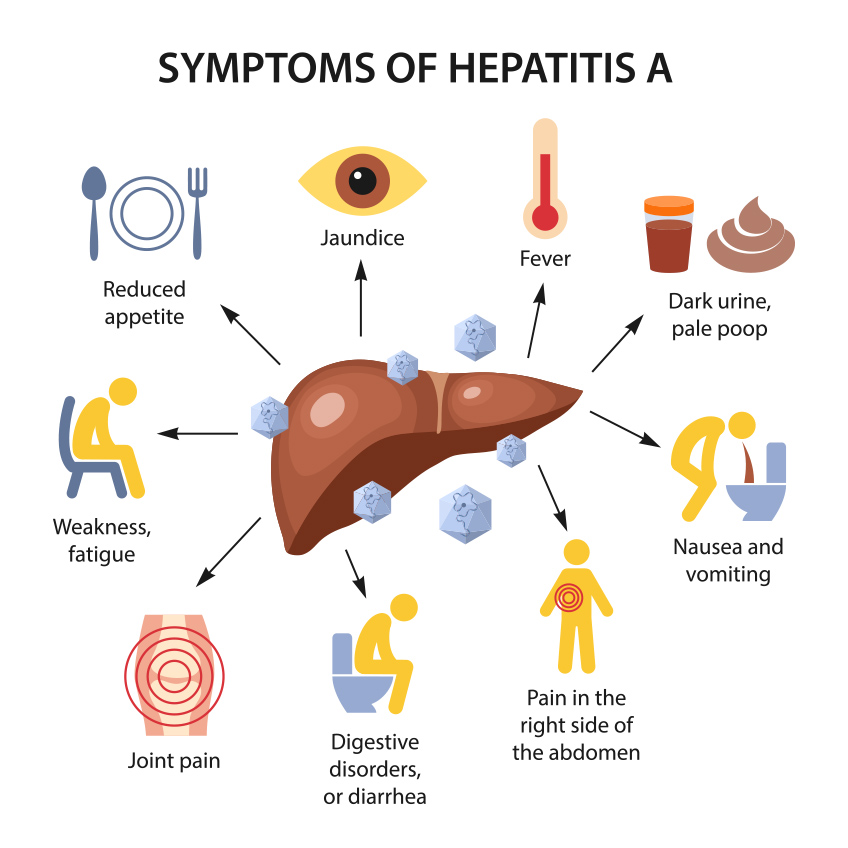Hepatitis A
What is Hepatitis?
Hepatitis means inflammation of the liver. There are different types of hepatitis, but this information will only focus on Hepatitis A.
What is Hepatitis A?
Hepatitis A is a virus (HAV) which causes a liver infection in humans which can result in a mild to a serious disease. Generally, everyone recovers from the infection, but in a few cases, one can die due to fulminant hepatitis (the liver becomes very necrotic and shrinks). Once infected, immunity to the virus lasts for life.
What are the symptoms of Hepatitis A?
The disease often has no symptoms or may be mild, particularly in children under 5 years of age. In adults, the onset of illness is usually sudden. Signs and symptoms include: What is the duration of symptoms?
What is the duration of symptoms?
Symptoms may last for 1-2 weeks or months. Prolonged, relapsing hepatitis for up to one year occurs in 15% of cases.
How is it spread?
The virus is transmitted through the faecal-oral route. This takes place when a person, who is/was not infected, ingests food or water that has been contaminated with the faeces of an infected person. It can be transmitted through the dirty hands of an infected person to other family members. Drinking water from sewage-contaminated or inadequately treated water will result in outbreaks. It can also be transmitted through sexual contact with an infected person. Hepatitis A is passed on by having sex without a condom or dental dam (particularly oral sex), fingering and rimming, or sharing sex toys with someone who has the virus.
If you are infected with Hepatitis A, you can spread it from 2 weeks before up to 1 week after you develop jaundice. The incubation period, meaning the time period between being exposed to the virus and developing symptoms of Hepatitis A, is 28 to 30 days (ranging from 15 to 50 days).
Who is at risk of infection?
Hepatitis A is rare in Malta but you may be at risk when you travel to countries where it is common or engage in certain activities as discussed further below. Hepatitis A can affect any age group. It can be transmitted through the following ways:
- Travellers travelling to under-developed countries.
- Through drinking of contaminated water and food.
- Poor hand hygiene. Hand hygiene is highly important, especially in under-developed countries. Use water and soap or alcohol (60%) hand sanitisers.
Safe food to eat:
- Cooked food which is served hot.
- Fruits and vegetables that you have washed with bottled water or you have peeled.
- Dairy products which have been pasteurised.
- Hard-boiled eggs.
Unsafe food not to eat:
- Food bought from street vendors.
- Raw or uncooked meat, fish or eggs.
- Fruits and vegetables which are unwashed or unpeeled, or washed by unsafe water, including salads.
- Dairy products which have not been pasteurised.
- Bushmeat.
Drink:
- Carbonated drinks.
- Sealed bottled water from reliable sources.
- Hot drinks.
- Pasteurised milk.
Do not drink:
- Drinks with ice, unless from a safe source.
- Tap water or opened bottled water.
- Unpasteurised milk.
- Fruit juices which have been reconstituted with unsafe water, such as from street vendors.
Try to avoid:
- Close contact, such as kissing, hugging, or sharing eating utensils or cups with people who are sick.
- Eating contaminated food or drinking contaminated water. The commonest high-risk food are raw oysters, clams, and other shellfish.
- Close personal contact with a person infected with Hepatitis A, such as during sex, especially for men who have sex with men (MSM).
- People living in the same house of an infected person through contaminated hands.
- Injection drug users through sharing of needles and/or injecting/reconstituting drugs on unclean surfaces such as public toilets.
Is there treatment for Hepatitis A?
There is no specific medical treatment for Hepatitis A.
How can Hepatitis A be prevented?
The most important measure to prevent the spread of Hepatitis A is hand hygiene. The transmission between individuals can be prevented through:
- Handwashing with soap and water.
- Washing and drying hands before preparing food.
- Washing and drying hands before eating.
- Washing and drying hands after going to the toilet.
- Washing and drying hands after changing a baby's nappy.
Hepatitis A is very contagious, so if infected, one should not attend work, school, childcare until advised by a doctor that one is no longer infectious to others. While you are sick with Hepatitis A, underwear, bedlinen, towels and handkerchiefs should be washed with hot water and detergent.
There is also a vaccine against Hepatitis A. The vaccine is taken in two doses, one injection followed by a booster dose 6 to 12 months after the first dose. This will give protection which may last 25 years. Vaccination is recommended for men who have sex with men, especially in adolescents and young adults. In older adults, testing is recommended prior to vaccination. The vaccine should be given to persons older than 1 year before travelling to moderate or high-risk countries, with protection being achieved 2 to 4 weeks after the first dose is given. Moderate and high endemic areas (meaning the disease is widespread in the particular area/country) include the Indian subcontinent, Africa, South and Central America, the Far East (excluding high income Asia Pacific), and Eastern Europe.
For more information on travel vaccination please visit: https://deputyprimeminister.gov.mt/en/phc/pchyhi/Pages/Travel-Vaccination.aspx.
Vaccines available in Malta
Click here for more information on vaccination.
Support and Contacts for further information contact
- Your GP (family doctor).
- The Genito-Urinary (GU) Clinic on 25457494/1.
- The Health Promotion and Disease Prevention Directorate on 23266000.
- The Detox helpline 22261800.
- Floriana Immunisation Centre: 25680222/3/4-25680000.
Resources List:
https://ecdc.europa.eu/en/hepatitis-A/facts
https://www.cdc.gov/hepatitis/hav/index.htm
https://www.cdc.gov/mmwr/volumes/67/wr/mm6743a5.htm
https://www.cdc.gov/hepatitis/resources/professionals/pdfs/ABCTable.pdf
https://www.health.gov.au/health-topics/hepatitis-a
https://www.healthed.govt.nz/resource/hepatitis
https://www.who.int/news-room/fact-sheets/detail/hepatitis-a